Unit 8 How are you Story time 课件(共75张PPT)
文档属性
| 名称 | Unit 8 How are you Story time 课件(共75张PPT) |
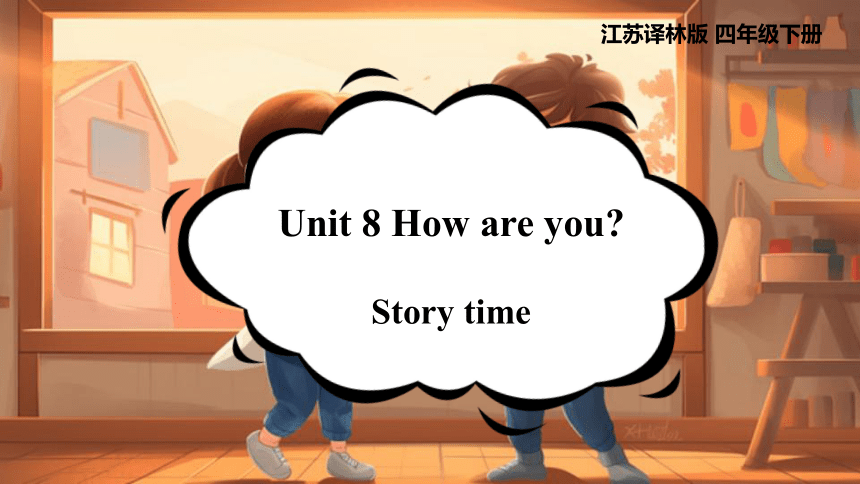
|
|
| 格式 | pptx | ||
| 文件大小 | 17.8MB | ||
| 资源类型 | 试卷 | ||
| 版本资源 | 牛津译林版 | ||
| 科目 | 英语 | ||
| 更新时间 | 2024-04-19 07:35:04 | ||
图片预览

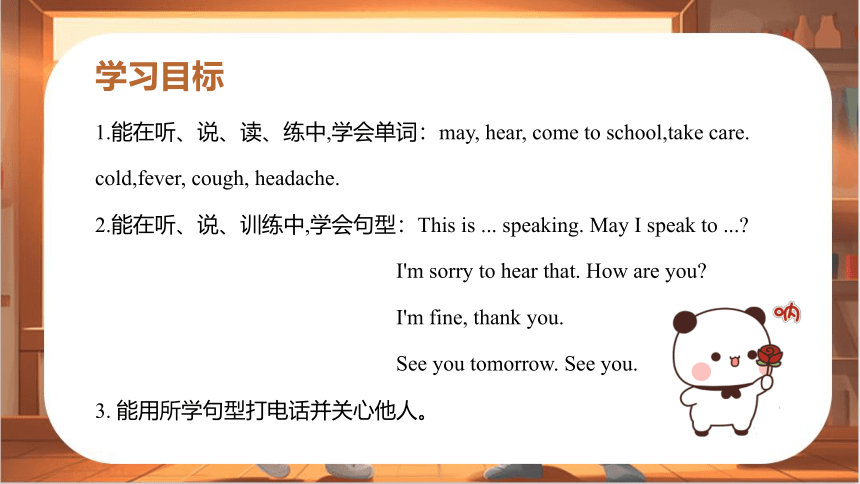
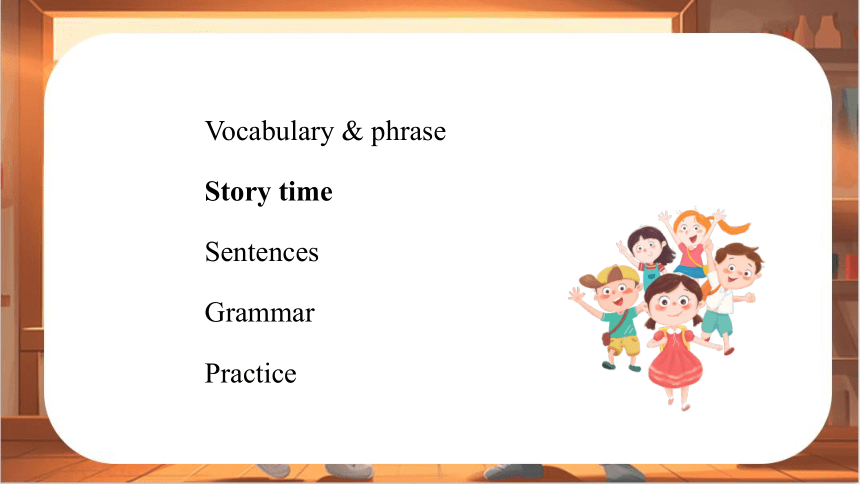
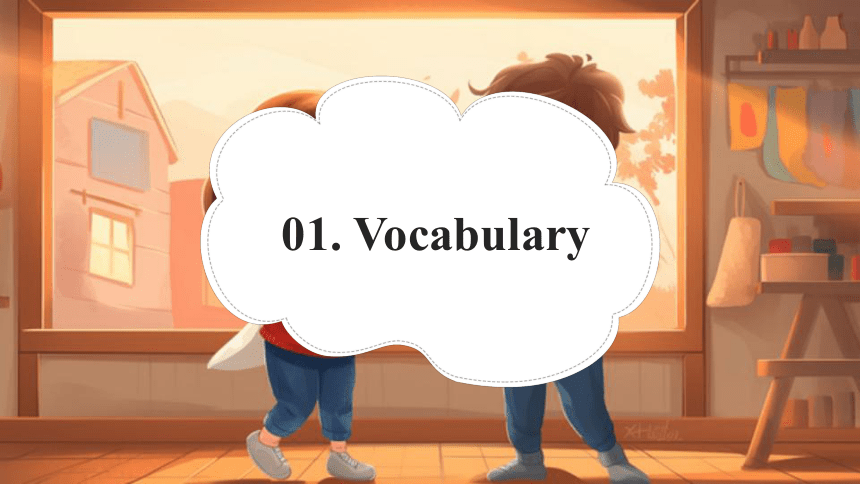
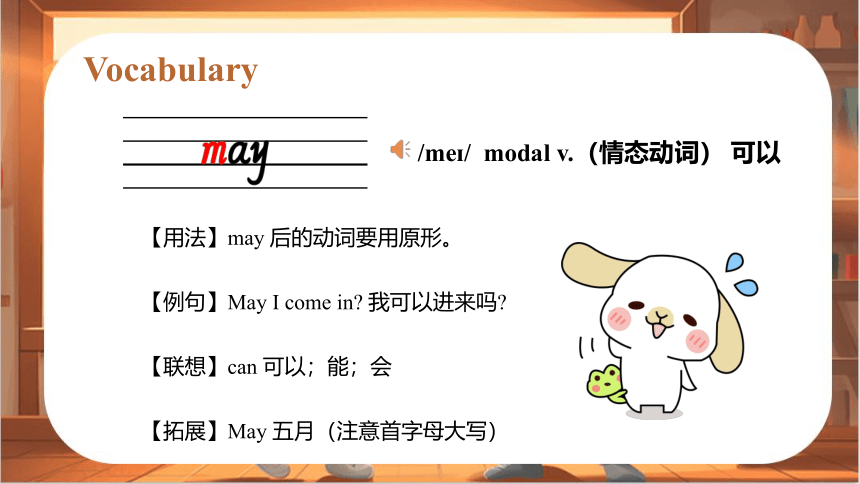
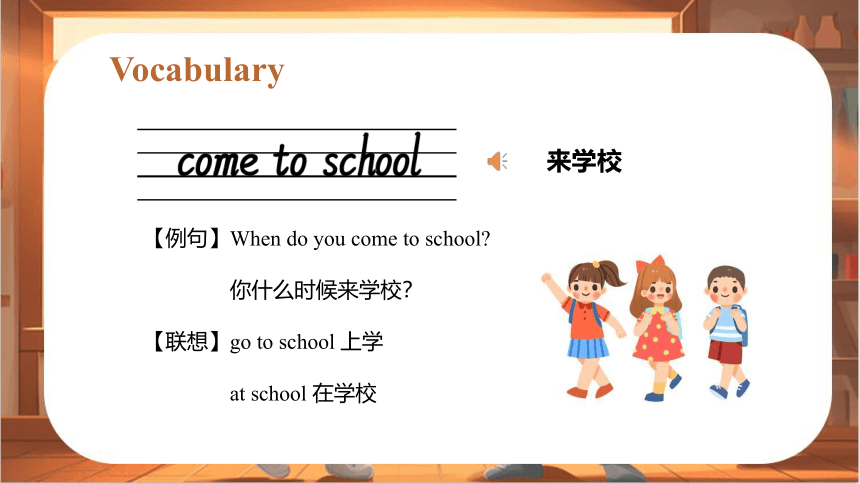
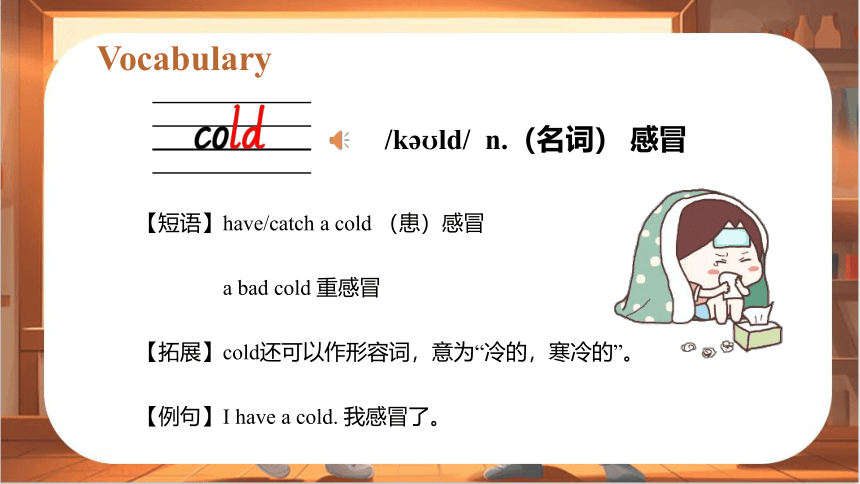
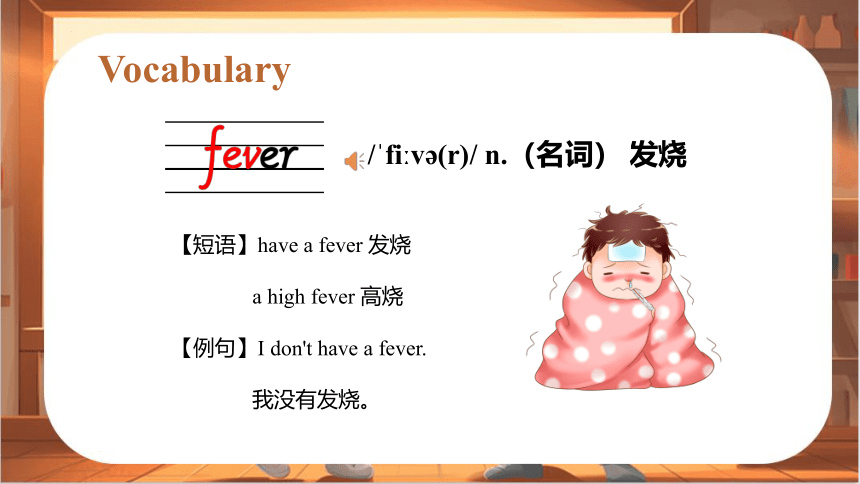
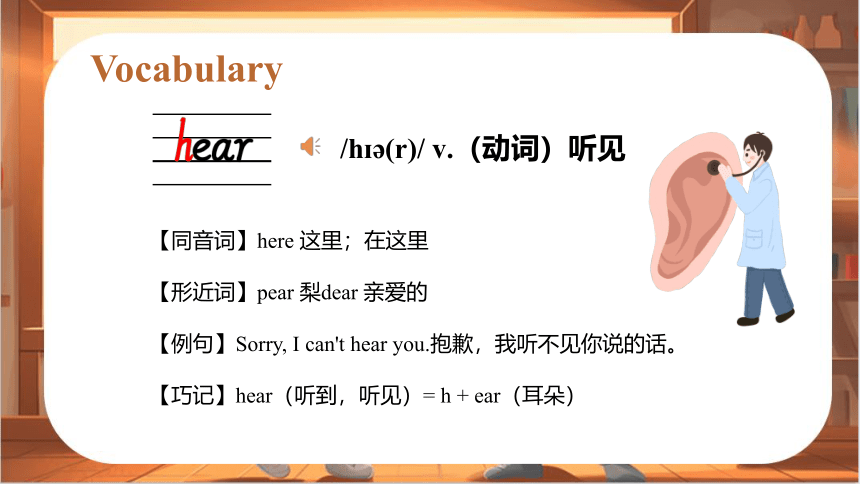
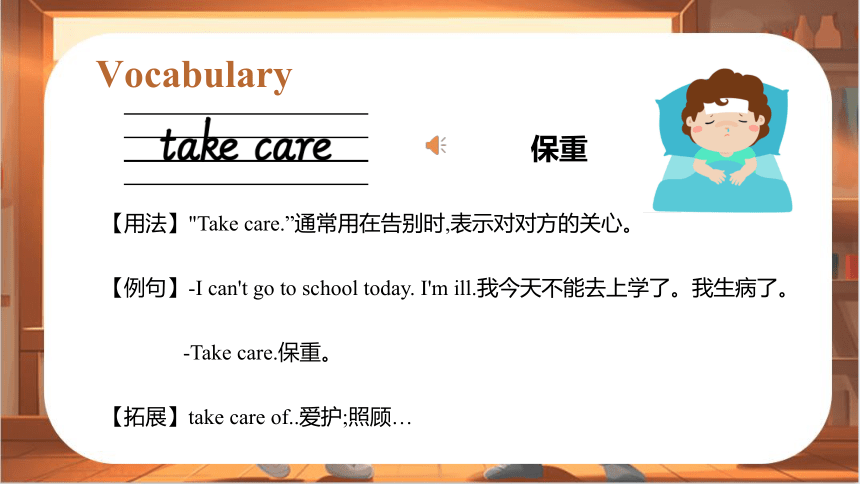
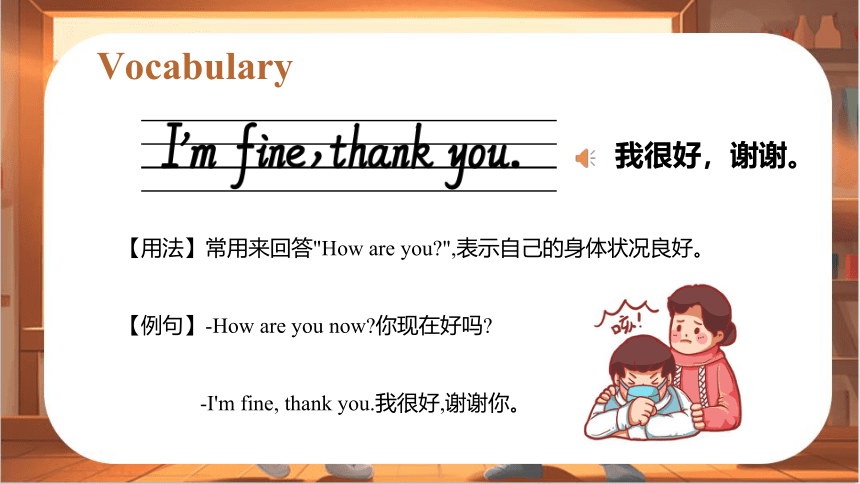

文档简介
(共75张PPT)
Unit 8 How are you
Story time
江苏译林版 四年级下册
1.能在听、说、读、练中,学会单词:may, hear, come to school,take care. cold,fever, cough, headache.
2.能在听、说、训练中,学会句型:This is ... speaking. May I speak to ...
I'm sorry to hear that. How are you
I'm fine, thank you.
See you tomorrow. See you.
3. 能用所学句型打电话并关心他人。
学习目标
Vocabulary & phrase
Story time
Sentences
Grammar
Practice
01. Vocabulary
【用法】may 后的动词要用原形。
【例句】May I come in 我可以进来吗
【联想】can 可以;能;会
【拓展】May 五月(注意首字母大写)
Vocabulary
/me / modal v.(情态动词) 可以
Vocabulary
【例句】When do you come to school
你什么时候来学校?
【联想】go to school 上学
at school 在学校
来学校
Vocabulary
【短语】have/catch a cold (患)感冒
a bad cold 重感冒
【拓展】cold还可以作形容词,意为“冷的,寒冷的”。
【例句】I have a cold. 我感冒了。
/k ld/ n.(名词) 感冒
Vocabulary
/ fi v (r)/ n.(名词) 发烧
【短语】have a fever 发烧
a high fever 高烧
【例句】I don't have a fever.
我没有发烧。
Vocabulary
/h (r)/ v.(动词)听见
【同音词】here 这里;在这里
【形近词】pear 梨dear 亲爱的
【例句】Sorry, I can't hear you.抱歉,我听不见你说的话。
【巧记】hear(听到,听见)= h + ear(耳朵)
【用法】"Take care.”通常用在告别时,表示对对方的关心。
【例句】-I can't go to school today. I'm ill.我今天不能去上学了。我生病了。
-Take care.保重。
【拓展】take care of..爱护;照顾…
Vocabulary
保重
【用法】常用来回答"How are you ",表示自己的身体状况良好。
【例句】-How are you now 你现在好吗
-I'm fine, thank you.我很好,谢谢你。
Vocabulary
我很好,谢谢。
Vocabulary
【讲解】"see you +时间.”意为“…见” ,是分别时的礼貌用语。
我们也可以简单地说"See you.” , 意为“再见”。
【拓展】常见的含有see you的告别用语:See you soon.一会儿见。
See you later. 稍后见。See you around 回头见。
明天见。
再见。
【短语】have a cough 咳嗽
【拓展】cough还可以作动词,意为“咳嗽”。
【例句】I feel cold and cough a lot.
我觉得冷,经常咳嗽。
Vocabulary
/k f/ n. (名词)咳嗽
Vocabulary
【短语】have a headache 头痛
【拓展】toothache 牙疼 stomachache 胃疼
【巧记】head(头)+ ache(疼痛)= headache (头疼,头痛)
/ hede k/ n.(名词) 头疼
Vocabulary
【讲解】常用来回答"How are you (你好吗 )”
【例句】—How are you 你好吗?
—Not so good. I have a cough.
不太好。我咳嗽。
不太好
Vocabulary
【例句】-Where are you now 你们现在在哪里
-We're at school.我们在学校。
【联想】at home 在家
在学校
头痛
咳嗽
发烧
在学校
cough
fever
at school
headache
02. Story time
Story time
Yang Ling: Hello, this is Yang Ling speaking. May I speak to Miss Li
Miss Li: Hello, Yang Ling. This is Miss Li.
Yang Ling: Hello, Miss Li. I can't come to school today.
Miss Li: What's the matter
Yang Ling: I have a cold and a fever.
Miss Li: I'm sorry to hear that. Take care, Yang Ling.
Yang Ling: Thank you, Miss Li.
Story time
This is.speaking.我是xxx。该句型用在打电话时向对方表明自己身份。
May I speak to….. 我可以跟xxx说话吗?该句型用在打电话时,向对方表明自己想与谁通话。
this is …我是xxx。该句型用在接电话时,向对方表明自己身份。
你怎么了? 询问身体情况
听到这个(消息)我很难过。
保重
我感冒发烧了。
Story time
Miss Li: Hello, this is Miss Li speaking.
Yang Ling: Hello, Miss Li. This is Yang Ling.
Miss Li: How are you now
Yang Ling: I'm fine, thank you.
Miss Li: Great. Can you come to school tomorrow
Yang Ling: Yes, I can.
Miss Li: See you tomorrow, Yang Ling.
Yang Ling: See you, Miss Li.
Story time
你现在还好吗?
我很好,谢谢。
再见
明天见
好极了。你明天能来学校吗?
May I speak to Miss Li
may是情态动词,可以与______代替
若接电话的人是你要找的人,对方可以说__________________
若对方不是你要找的人,对方可以说______________________
2. I have a cold and a fever.
表达某人得了某种病,可以用句型:____________________________
have a_______患感冒 have a_______患发烧
have a_______患咳嗽 have a_______患头痛
练习:(1)I’m ill. I have a_______.
A.fever B.a fever
(2)My brother ______a headache.
A.have B.has
如何用英语打电话
【课文应用】 Hello,this is Yang Ling speaking. 你好,我是杨玲。
你会用英语打电话吗 让我们一起来看一看如何用英语打电话吧!
接通电话后,一般先说hello/hi,然后说出自己的名字或电话号码,以便让对方知道你是谁。
-Hello,this is 2235478. 你好,我是2235478。
-Hello,this is Tom speaking. 你好,我是汤姆。
如何用英语打电话
在电话中问“你是谁 ”时,一般不说“ Who are you ”,而说“ Who is that(speaking) ”。若回答“我是玛丽”,一般不说“ I'm Mary.”,而说“ This is Mary( speaking).”。
若发现对方找错了号码,一般应再说一下自己的电话号码或名字,告诉对方”sorry,you've dialed the wrong number(对不起,你找错吗了)”,然后再挂电话。若是你自己播错了号码,你应该说“Sorry,I've dialed the wrong number.(对不起,我拨错号码了。)”。
找某人接电话的句型- May I speak to…
【课文应用】 May I speak to Miss Li 我可以和李老师说话吗
【句型结构】 May I speak to+某人( Miss Wang,Lily...)
【重点解析】may是情态动词,没有人称和数的变化。在此句型中,也可以用can代替may。如果接电话的人正是对方要找的人,接电话的人可以说“ This is.(speaking).(我是……)”;如果接电话的人不是对方要找的人,接电话的人可以说“ Hold on, please.(请稍等。)”
如何表达得知某事自己很难过
【课文应用】I'm sorry to hear that..听到这个消息我很难过。
【句型结构】I'm sorry to hear that.
【重点解析】当你听到不好或者不幸的消息时,可以用这句话表示同情和惋惜。sorry在这里是“难过,惋惜”的意思。
含有 see you的告别语
【课文应用】 See you tomorrow,Yang Ling.明天见,杨玲。
See you,Miss Li. 再见,李老师。
“ See you tomorrow.(明天见。)”和“" See you(再见。)”都是常用的告别语。一起来看看还有哪些含有 see you的告别语:
See you soon!一会儿见! See you around. 回头见。
See you later. 稍后见。 See you this evening. 今晚见。
几种“再见"的表达方式
与一般朋友道别:Bye.(再见。)/ Bye-bye.(再见。/ Goodbye_(再见。)/See you later/ tomorrow.(迟些/明天见。)/I think it's time for me to leave now.(在别人家做客临走时可以用这句话,意为“我想我现在该走了”。)
与自己的亲友告别: I will miss you!(我会想你的!)
I hope to see you again sometime next year.(我希望明年某个时候再见到你。)
Take good care of yourself!(照顾好你自己!)
描述自己生了什么病的句型- I have a/an…
【课文应用】I have a cold and a fever.我感冒并且发烧了。
【句型结构】 I have a/an+疾病名称( cough,headache,earache...).
【重点解析】在此句型中,have表示“生病”,后面常接表示疾病的名词。
这是一种很常见的说法,常用于口语中。
需要注意的是,当表示疾病的名词的读音以元音音素开头时,前面要用an
描述自己生了什么病的句型- I have a/an…
表示“生了……病”的常见短语如下:
have a cold感冒, have a fever发烧,
have a toothache牙疼, have a headache 头疼,
have a stomachache胃疼, have an earache耳朵疼。
询问对方是否能做某事的句型一 Can you…
【课文应用】 -Can you come to school tomorrow 你明天能来学校吗
-Yes,I can. 是的,我能。
【句型结构】问句: Can you+动词原形( swim, dance, read...)(+其他)
答语:Yes,I/ we can.No,I/ we can't.
【重点解析】问句用于询问对方是否能做某事。
“ Can you… ”是“I/We can…”的一般疑问句形式。
can是情态动词,意为“能;可以;会”。
肯定回答为“Yes,I/ we can.”
否定回答为“No,I/ we can't.”
如何询问对方的身体状况
【课文应用】 How are you 你好吗
I'm fine,thank you./ Not so good.我很好,谢谢你。/不太好。
【句型结构】问句: How are you 答语: I'm fine,thank you./ Not so good
【重点解析】“ How are you "是ー个较常用的日常问候语,主要用于询问对方的身体状况。
如何询问对方的身体状况
“ How are you ”意为“你(身体)好吗 ”。要根据当时的具体情况进行回答。
如果身体状况良好,则回答“I'm fine, thank you.(我很好,谢谢你。)/ Very well.(非常好。)”;
如果身体状况不太好,则回答“ Not so good.(不太好。)”。
如何向对方表示关心
【课文应用】 Take care,Yang Ling.保重,杨玲。
【句型结构】 Take care.
【重点解析】“ Take care.”通常用在告别时,表示对对方的关心。
Story time
03. Sentences
Sentences
a cold 感冒
a cough 咳嗽
a fever 发烧
a headache 头疼
Sentences
a cold 感冒
a cough 咳嗽
a fever 发烧
a headache 头疼
Yang Ling: Hello, this is Yang Ling speaking. May I speak to Miss Li
杨玲:你好,我是杨玲。我可以和李老师说话吗?
Miss Li: Hello, Yang Ling. This is Miss Li.
李老师:你好,杨玲。我是李老师。
Yang Ling: Hello, Miss Li. I can't come to school today.
杨玲:你好,李老师。我今天不能来学校了。
Sentences
Miss Li: What's the matter 李老师:怎么了?
Yang Ling: I have a cold and a fever. 杨玲:我感冒并且发烧了。
Miss Li: I'm sorry to hear that. Take care, Yang Ling.
李老师:听到这个消息我很难过。保重,杨玲。
Yang Ling: Thank you, Miss Li.
杨玲:谢谢你,李老师。
Sentences
Miss Li: Hello, this is Miss Li speaking. 李老师:你好,我是李老师。
Yang Ling: Hello, Miss Li. This is Yang Ling.
杨玲:你好,李老师。我是杨玲。
Miss Li: How are you now 李老师:你现在怎么样?
Yang Ling: I'm fine, thank you.
杨玲:我很好,谢谢你。
Sentences
Miss Li: Great. Can you come to school tomorrow
李老师:太好了。你明天能来学校吗?
Yang Ling: Yes, I can. 杨玲:是的,我能。
Miss Li: See you tomorrow, Yang Ling.
李老师:明天见,杨玲。
Yang Ling: See you, Miss Li. 杨玲:再见,李老师。
Sentences
Grammar
1.问身体状况:
(1)How are you?你好吗?回答:I’m fine,Thank you/ Not so good/ Not bad
(2)What’s the matter?或What’s wrong with …?
回答用“I have a …”句型。
have表示“患病,得病”,后面接疾病名称,而且前面通常加上a. 如,
--What’s the matter with her – She has a terrible headache.
2. How are you 的用法。
(1)身体很好时,如:
--How are you --I’m fine, thank you. / I’m very well, thank you.
(2)身体情况一般时,如:
--How are you --Not bad, thank you.
2. How are you 的用法。
(3)身体不太好时,如:
--How are you --Not so good. / Not very well.
当你听到别人身体不太好时,应该表达以下同情,以示关心。如:
--How are you --Not so good. I have a fever.--I’m sorry to hear that.
3.打电话用语
(1)打电话时先介绍自己:Hello. This is …speaking. 一般不用“I am …”句型。
(2)请某人接电话:Hello, may I speak to …?/I’d like to speak to… / Is …there
(3)询问对方是谁,可以说:Who’s that speaking / calling 而不用“Who are you ”
(4)接电话的恰好是对方要找的人,可以说:This is … speaking./Speaking.
如何用英语打电话:Hello, this is ..... (speaking).
接通电话后,一般先说hello/hi,然后报自己的名字或电话号码,以便对方知道你是谁。
Hello, this is Mike (speaking).
在电话中问“你是谁”,一般不说who are you ,而是说who is that (speaking)
若回答我是迈克,一般不说I’m Mike. 而是说This is Mike (speaking).
如何找某人接电话:May I speak to ....
May I speak to + 某人?
May是情态动词,后面接动词原形,没有人称和数的变化。也可以用can代替,但may语气更委婉些
在回答时,如果接电话的正是要找的人,可以说:this is .... speaking.
若果接电话的不是要找的人,可以说hold on, please.请稍等
明天见 - see you tomorrow
See you soon一会见
See you再见=goodbye=bye
See you later吃些再见
See you around回头见
See you this evening晚上见
4.关于“生病”的拓展阅读:
(1) have:表示“生病”,后常跟表示疾病的名词,是最通俗的说法,多用于口语。
例句: My brother has a bad fever.
Grammar
4.关于“生病”的拓展阅读:
(2)take/catch:均可表示“生病”,且含有“感染”之意。美国人多用take,英国人多用catch。
例句:Mary takes cold easily. 玛丽易患感冒。
His son catches a cold. 他儿子得了感冒。
Grammar
(3) get:常作“生病”讲,后接表示疾病的名词。
例:My uncle gets a flu.
我叔叔患了流行性感冒。
Grammar
04. Practice
英汉互译。1.和我妈妈通话__________________ 2.保重__________________3.来学校__________________ 4.再见__________________5.明天下午__________________ 6.Not so good_______________7.have a headache__________________ 8.the cake in the box__________9.see a doctor__________________ 10.at school_________________
根据句意,用所给单词的适当形式填空。1. Let’s go ______ (swim) in the pool.2. Can Mike ______ (come) to the party 3. It’s ______ (sun) today. Let’s go to the park.4. I’m sorry ______ (hear) that.5. May I ______ (speak) to Sue
根据中文、首字母或所给单词提示填空。
1.Liu Tao h________a bad ________(头痛).
2.I’m ________(遗憾的)to h________ that.
3.A:What’s the m________with you B:I have a ________(咳嗽).
4.Can you c________to school tomorrow
5.Helen would like ________(speak) to Miss Li.
单项选择。
( ) 1. We have nine _______this term.
A. subject B. lessons C. subjects
( ) 2. __________are you Not so good.
A. How about B. How C. What about
( ) 3. I have a fever. __________
A. Thank you. B. Great! C. I’m sorry to hear that.
根据上下文补全对话。
A:Hello,this is Miss Li._________I__________to Su Hai
B:Sorry, Miss Li.She’s not in. _________is her father__________.
A:Mr Su,why doesn’t Su Hai_________to school today
B:She’s ill.Her mother takes her to see a doctor.
A:What’s the _________with_________
B:She ________a bad cough.
A:I’m sorry to _________that._______ care.
B:Thank you.
( )4. What are __________ over thereA. that B. those C. these( )5. __________ a big cake!A. How B. What C. What’s( )6. We have a PE lesson ____ four ________ Monday.A. in , at B. at, on C. on, at
( )7. I have a __________ lesson today.A. swim B. swiming C. swimming ( )8. --What time is it -- It’s __________ .A. eight-forty B. eight and fourteen C. eight fourteen( )9. We have nine _________ this term.A. subjects B. lessons C. subject
( )10. They can see a boat ____________ the river.A. on B. at C. in( )11. Look at the flowers. Can you draw _______ A. then B. it C. them( )12. --Do you like Science --___________. It’s too difficult. But I like PE.A. Yes, I do. B. No, it isn’t. C. No, I don’t.
( )13.__________ summer, I like eating ice creams.
A.On B.In C.At
( )14.I usually go ___________ in winter.
A.skate B.skateing C. skating
连词成句。
1. I, forty, at, up, get, seven, Monday, on(.)_______________________
2. over, T—shirt,whose, that, is, there ( )__________________
3. I, can, a, look, at, your, dress, new, have ( )_____________________
4. Mike, play, in, playground, the, after, football, I , and, school(.)____
5. would, how, like, many, you, books( )________________
将下列句子翻译成中文。
1.—在秋天,天气很凉爽。我们去爬山和野炊。我们喜欢秋天。你呢?
—我也是。
—In _________ ,it’s_________.
We ___________ ___________ and___________ ___________.
We like_________. ___________ about you
—Me too.
2.—你在夏天可以做什么?
—我可以吃冰淇淋和去游泳。
—__________ can you do in _________
—We can eat __________ __________ and go ___________.
3.—你喜欢冬天吗?—是的,我喜欢堆雪人。
—_________ you like __________
—Yes, I ________. I like making ___________.
4.—这件衬衫是谁的? —是我表弟的。
—__________ shirt _________ __________ —It’s my cousin’s.
5.—你的手套在哪里? —它们在我的书包里。
—Where __________ your __________ —__________ in my schoolbag.
排列句子。
( ) They' re my father's.
( ) Hello, Helen.
( ) Whose dress is this, Helen
( ) Your dress is so beautiful.
( ) Hello, Su Hai.
( ) Thank you.
( 3 ) Look at my gloves, Helen.
( ) It's my cousin’s.
( ) They' re so big. Whose gloves are they
句子排序。
A. Hello, Miss Li. I can’t go to school today.
B. Hello, this is Liu Tao. May I speak to Miss Li
C. What’s the matter
D. Hello, Liu Tao. This is Miss Li speaking.
E. I have a cold and a fever.
F. Thank you, Miss Li.
G. I’m sorry to hear that. Take care, please.
阅读短文,判断正(T)误(F)。
Today is Tuesday. David doesn't go to school. He has a bad cold.There are four lessons in the morning and one in the afternoon. When classes are over, Mike calls David. David feels(感觉) better. He wants to finish(完成) the homework.So Mike will(将) take the homework to him, and get some apples for him too.
( )1. Mike doesn't go to school today.
( )2.David has a bad cold.
( )3.Mike has five lessons on Tuesday.
( )4.David will get some apples for Mike.
( )5. David wants to do his homework.
Thank you!
江苏译林版 四年级下册
Unit 8 How are you
Story time
江苏译林版 四年级下册
1.能在听、说、读、练中,学会单词:may, hear, come to school,take care. cold,fever, cough, headache.
2.能在听、说、训练中,学会句型:This is ... speaking. May I speak to ...
I'm sorry to hear that. How are you
I'm fine, thank you.
See you tomorrow. See you.
3. 能用所学句型打电话并关心他人。
学习目标
Vocabulary & phrase
Story time
Sentences
Grammar
Practice
01. Vocabulary
【用法】may 后的动词要用原形。
【例句】May I come in 我可以进来吗
【联想】can 可以;能;会
【拓展】May 五月(注意首字母大写)
Vocabulary
/me / modal v.(情态动词) 可以
Vocabulary
【例句】When do you come to school
你什么时候来学校?
【联想】go to school 上学
at school 在学校
来学校
Vocabulary
【短语】have/catch a cold (患)感冒
a bad cold 重感冒
【拓展】cold还可以作形容词,意为“冷的,寒冷的”。
【例句】I have a cold. 我感冒了。
/k ld/ n.(名词) 感冒
Vocabulary
/ fi v (r)/ n.(名词) 发烧
【短语】have a fever 发烧
a high fever 高烧
【例句】I don't have a fever.
我没有发烧。
Vocabulary
/h (r)/ v.(动词)听见
【同音词】here 这里;在这里
【形近词】pear 梨dear 亲爱的
【例句】Sorry, I can't hear you.抱歉,我听不见你说的话。
【巧记】hear(听到,听见)= h + ear(耳朵)
【用法】"Take care.”通常用在告别时,表示对对方的关心。
【例句】-I can't go to school today. I'm ill.我今天不能去上学了。我生病了。
-Take care.保重。
【拓展】take care of..爱护;照顾…
Vocabulary
保重
【用法】常用来回答"How are you ",表示自己的身体状况良好。
【例句】-How are you now 你现在好吗
-I'm fine, thank you.我很好,谢谢你。
Vocabulary
我很好,谢谢。
Vocabulary
【讲解】"see you +时间.”意为“…见” ,是分别时的礼貌用语。
我们也可以简单地说"See you.” , 意为“再见”。
【拓展】常见的含有see you的告别用语:See you soon.一会儿见。
See you later. 稍后见。See you around 回头见。
明天见。
再见。
【短语】have a cough 咳嗽
【拓展】cough还可以作动词,意为“咳嗽”。
【例句】I feel cold and cough a lot.
我觉得冷,经常咳嗽。
Vocabulary
/k f/ n. (名词)咳嗽
Vocabulary
【短语】have a headache 头痛
【拓展】toothache 牙疼 stomachache 胃疼
【巧记】head(头)+ ache(疼痛)= headache (头疼,头痛)
/ hede k/ n.(名词) 头疼
Vocabulary
【讲解】常用来回答"How are you (你好吗 )”
【例句】—How are you 你好吗?
—Not so good. I have a cough.
不太好。我咳嗽。
不太好
Vocabulary
【例句】-Where are you now 你们现在在哪里
-We're at school.我们在学校。
【联想】at home 在家
在学校
头痛
咳嗽
发烧
在学校
cough
fever
at school
headache
02. Story time
Story time
Yang Ling: Hello, this is Yang Ling speaking. May I speak to Miss Li
Miss Li: Hello, Yang Ling. This is Miss Li.
Yang Ling: Hello, Miss Li. I can't come to school today.
Miss Li: What's the matter
Yang Ling: I have a cold and a fever.
Miss Li: I'm sorry to hear that. Take care, Yang Ling.
Yang Ling: Thank you, Miss Li.
Story time
This is.speaking.我是xxx。该句型用在打电话时向对方表明自己身份。
May I speak to….. 我可以跟xxx说话吗?该句型用在打电话时,向对方表明自己想与谁通话。
this is …我是xxx。该句型用在接电话时,向对方表明自己身份。
你怎么了? 询问身体情况
听到这个(消息)我很难过。
保重
我感冒发烧了。
Story time
Miss Li: Hello, this is Miss Li speaking.
Yang Ling: Hello, Miss Li. This is Yang Ling.
Miss Li: How are you now
Yang Ling: I'm fine, thank you.
Miss Li: Great. Can you come to school tomorrow
Yang Ling: Yes, I can.
Miss Li: See you tomorrow, Yang Ling.
Yang Ling: See you, Miss Li.
Story time
你现在还好吗?
我很好,谢谢。
再见
明天见
好极了。你明天能来学校吗?
May I speak to Miss Li
may是情态动词,可以与______代替
若接电话的人是你要找的人,对方可以说__________________
若对方不是你要找的人,对方可以说______________________
2. I have a cold and a fever.
表达某人得了某种病,可以用句型:____________________________
have a_______患感冒 have a_______患发烧
have a_______患咳嗽 have a_______患头痛
练习:(1)I’m ill. I have a_______.
A.fever B.a fever
(2)My brother ______a headache.
A.have B.has
如何用英语打电话
【课文应用】 Hello,this is Yang Ling speaking. 你好,我是杨玲。
你会用英语打电话吗 让我们一起来看一看如何用英语打电话吧!
接通电话后,一般先说hello/hi,然后说出自己的名字或电话号码,以便让对方知道你是谁。
-Hello,this is 2235478. 你好,我是2235478。
-Hello,this is Tom speaking. 你好,我是汤姆。
如何用英语打电话
在电话中问“你是谁 ”时,一般不说“ Who are you ”,而说“ Who is that(speaking) ”。若回答“我是玛丽”,一般不说“ I'm Mary.”,而说“ This is Mary( speaking).”。
若发现对方找错了号码,一般应再说一下自己的电话号码或名字,告诉对方”sorry,you've dialed the wrong number(对不起,你找错吗了)”,然后再挂电话。若是你自己播错了号码,你应该说“Sorry,I've dialed the wrong number.(对不起,我拨错号码了。)”。
找某人接电话的句型- May I speak to…
【课文应用】 May I speak to Miss Li 我可以和李老师说话吗
【句型结构】 May I speak to+某人( Miss Wang,Lily...)
【重点解析】may是情态动词,没有人称和数的变化。在此句型中,也可以用can代替may。如果接电话的人正是对方要找的人,接电话的人可以说“ This is.(speaking).(我是……)”;如果接电话的人不是对方要找的人,接电话的人可以说“ Hold on, please.(请稍等。)”
如何表达得知某事自己很难过
【课文应用】I'm sorry to hear that..听到这个消息我很难过。
【句型结构】I'm sorry to hear that.
【重点解析】当你听到不好或者不幸的消息时,可以用这句话表示同情和惋惜。sorry在这里是“难过,惋惜”的意思。
含有 see you的告别语
【课文应用】 See you tomorrow,Yang Ling.明天见,杨玲。
See you,Miss Li. 再见,李老师。
“ See you tomorrow.(明天见。)”和“" See you(再见。)”都是常用的告别语。一起来看看还有哪些含有 see you的告别语:
See you soon!一会儿见! See you around. 回头见。
See you later. 稍后见。 See you this evening. 今晚见。
几种“再见"的表达方式
与一般朋友道别:Bye.(再见。)/ Bye-bye.(再见。/ Goodbye_(再见。)/See you later/ tomorrow.(迟些/明天见。)/I think it's time for me to leave now.(在别人家做客临走时可以用这句话,意为“我想我现在该走了”。)
与自己的亲友告别: I will miss you!(我会想你的!)
I hope to see you again sometime next year.(我希望明年某个时候再见到你。)
Take good care of yourself!(照顾好你自己!)
描述自己生了什么病的句型- I have a/an…
【课文应用】I have a cold and a fever.我感冒并且发烧了。
【句型结构】 I have a/an+疾病名称( cough,headache,earache...).
【重点解析】在此句型中,have表示“生病”,后面常接表示疾病的名词。
这是一种很常见的说法,常用于口语中。
需要注意的是,当表示疾病的名词的读音以元音音素开头时,前面要用an
描述自己生了什么病的句型- I have a/an…
表示“生了……病”的常见短语如下:
have a cold感冒, have a fever发烧,
have a toothache牙疼, have a headache 头疼,
have a stomachache胃疼, have an earache耳朵疼。
询问对方是否能做某事的句型一 Can you…
【课文应用】 -Can you come to school tomorrow 你明天能来学校吗
-Yes,I can. 是的,我能。
【句型结构】问句: Can you+动词原形( swim, dance, read...)(+其他)
答语:Yes,I/ we can.No,I/ we can't.
【重点解析】问句用于询问对方是否能做某事。
“ Can you… ”是“I/We can…”的一般疑问句形式。
can是情态动词,意为“能;可以;会”。
肯定回答为“Yes,I/ we can.”
否定回答为“No,I/ we can't.”
如何询问对方的身体状况
【课文应用】 How are you 你好吗
I'm fine,thank you./ Not so good.我很好,谢谢你。/不太好。
【句型结构】问句: How are you 答语: I'm fine,thank you./ Not so good
【重点解析】“ How are you "是ー个较常用的日常问候语,主要用于询问对方的身体状况。
如何询问对方的身体状况
“ How are you ”意为“你(身体)好吗 ”。要根据当时的具体情况进行回答。
如果身体状况良好,则回答“I'm fine, thank you.(我很好,谢谢你。)/ Very well.(非常好。)”;
如果身体状况不太好,则回答“ Not so good.(不太好。)”。
如何向对方表示关心
【课文应用】 Take care,Yang Ling.保重,杨玲。
【句型结构】 Take care.
【重点解析】“ Take care.”通常用在告别时,表示对对方的关心。
Story time
03. Sentences
Sentences
a cold 感冒
a cough 咳嗽
a fever 发烧
a headache 头疼
Sentences
a cold 感冒
a cough 咳嗽
a fever 发烧
a headache 头疼
Yang Ling: Hello, this is Yang Ling speaking. May I speak to Miss Li
杨玲:你好,我是杨玲。我可以和李老师说话吗?
Miss Li: Hello, Yang Ling. This is Miss Li.
李老师:你好,杨玲。我是李老师。
Yang Ling: Hello, Miss Li. I can't come to school today.
杨玲:你好,李老师。我今天不能来学校了。
Sentences
Miss Li: What's the matter 李老师:怎么了?
Yang Ling: I have a cold and a fever. 杨玲:我感冒并且发烧了。
Miss Li: I'm sorry to hear that. Take care, Yang Ling.
李老师:听到这个消息我很难过。保重,杨玲。
Yang Ling: Thank you, Miss Li.
杨玲:谢谢你,李老师。
Sentences
Miss Li: Hello, this is Miss Li speaking. 李老师:你好,我是李老师。
Yang Ling: Hello, Miss Li. This is Yang Ling.
杨玲:你好,李老师。我是杨玲。
Miss Li: How are you now 李老师:你现在怎么样?
Yang Ling: I'm fine, thank you.
杨玲:我很好,谢谢你。
Sentences
Miss Li: Great. Can you come to school tomorrow
李老师:太好了。你明天能来学校吗?
Yang Ling: Yes, I can. 杨玲:是的,我能。
Miss Li: See you tomorrow, Yang Ling.
李老师:明天见,杨玲。
Yang Ling: See you, Miss Li. 杨玲:再见,李老师。
Sentences
Grammar
1.问身体状况:
(1)How are you?你好吗?回答:I’m fine,Thank you/ Not so good/ Not bad
(2)What’s the matter?或What’s wrong with …?
回答用“I have a …”句型。
have表示“患病,得病”,后面接疾病名称,而且前面通常加上a. 如,
--What’s the matter with her – She has a terrible headache.
2. How are you 的用法。
(1)身体很好时,如:
--How are you --I’m fine, thank you. / I’m very well, thank you.
(2)身体情况一般时,如:
--How are you --Not bad, thank you.
2. How are you 的用法。
(3)身体不太好时,如:
--How are you --Not so good. / Not very well.
当你听到别人身体不太好时,应该表达以下同情,以示关心。如:
--How are you --Not so good. I have a fever.--I’m sorry to hear that.
3.打电话用语
(1)打电话时先介绍自己:Hello. This is …speaking. 一般不用“I am …”句型。
(2)请某人接电话:Hello, may I speak to …?/I’d like to speak to… / Is …there
(3)询问对方是谁,可以说:Who’s that speaking / calling 而不用“Who are you ”
(4)接电话的恰好是对方要找的人,可以说:This is … speaking./Speaking.
如何用英语打电话:Hello, this is ..... (speaking).
接通电话后,一般先说hello/hi,然后报自己的名字或电话号码,以便对方知道你是谁。
Hello, this is Mike (speaking).
在电话中问“你是谁”,一般不说who are you ,而是说who is that (speaking)
若回答我是迈克,一般不说I’m Mike. 而是说This is Mike (speaking).
如何找某人接电话:May I speak to ....
May I speak to + 某人?
May是情态动词,后面接动词原形,没有人称和数的变化。也可以用can代替,但may语气更委婉些
在回答时,如果接电话的正是要找的人,可以说:this is .... speaking.
若果接电话的不是要找的人,可以说hold on, please.请稍等
明天见 - see you tomorrow
See you soon一会见
See you再见=goodbye=bye
See you later吃些再见
See you around回头见
See you this evening晚上见
4.关于“生病”的拓展阅读:
(1) have:表示“生病”,后常跟表示疾病的名词,是最通俗的说法,多用于口语。
例句: My brother has a bad fever.
Grammar
4.关于“生病”的拓展阅读:
(2)take/catch:均可表示“生病”,且含有“感染”之意。美国人多用take,英国人多用catch。
例句:Mary takes cold easily. 玛丽易患感冒。
His son catches a cold. 他儿子得了感冒。
Grammar
(3) get:常作“生病”讲,后接表示疾病的名词。
例:My uncle gets a flu.
我叔叔患了流行性感冒。
Grammar
04. Practice
英汉互译。1.和我妈妈通话__________________ 2.保重__________________3.来学校__________________ 4.再见__________________5.明天下午__________________ 6.Not so good_______________7.have a headache__________________ 8.the cake in the box__________9.see a doctor__________________ 10.at school_________________
根据句意,用所给单词的适当形式填空。1. Let’s go ______ (swim) in the pool.2. Can Mike ______ (come) to the party 3. It’s ______ (sun) today. Let’s go to the park.4. I’m sorry ______ (hear) that.5. May I ______ (speak) to Sue
根据中文、首字母或所给单词提示填空。
1.Liu Tao h________a bad ________(头痛).
2.I’m ________(遗憾的)to h________ that.
3.A:What’s the m________with you B:I have a ________(咳嗽).
4.Can you c________to school tomorrow
5.Helen would like ________(speak) to Miss Li.
单项选择。
( ) 1. We have nine _______this term.
A. subject B. lessons C. subjects
( ) 2. __________are you Not so good.
A. How about B. How C. What about
( ) 3. I have a fever. __________
A. Thank you. B. Great! C. I’m sorry to hear that.
根据上下文补全对话。
A:Hello,this is Miss Li._________I__________to Su Hai
B:Sorry, Miss Li.She’s not in. _________is her father__________.
A:Mr Su,why doesn’t Su Hai_________to school today
B:She’s ill.Her mother takes her to see a doctor.
A:What’s the _________with_________
B:She ________a bad cough.
A:I’m sorry to _________that._______ care.
B:Thank you.
( )4. What are __________ over thereA. that B. those C. these( )5. __________ a big cake!A. How B. What C. What’s( )6. We have a PE lesson ____ four ________ Monday.A. in , at B. at, on C. on, at
( )7. I have a __________ lesson today.A. swim B. swiming C. swimming ( )8. --What time is it -- It’s __________ .A. eight-forty B. eight and fourteen C. eight fourteen( )9. We have nine _________ this term.A. subjects B. lessons C. subject
( )10. They can see a boat ____________ the river.A. on B. at C. in( )11. Look at the flowers. Can you draw _______ A. then B. it C. them( )12. --Do you like Science --___________. It’s too difficult. But I like PE.A. Yes, I do. B. No, it isn’t. C. No, I don’t.
( )13.__________ summer, I like eating ice creams.
A.On B.In C.At
( )14.I usually go ___________ in winter.
A.skate B.skateing C. skating
连词成句。
1. I, forty, at, up, get, seven, Monday, on(.)_______________________
2. over, T—shirt,whose, that, is, there ( )__________________
3. I, can, a, look, at, your, dress, new, have ( )_____________________
4. Mike, play, in, playground, the, after, football, I , and, school(.)____
5. would, how, like, many, you, books( )________________
将下列句子翻译成中文。
1.—在秋天,天气很凉爽。我们去爬山和野炊。我们喜欢秋天。你呢?
—我也是。
—In _________ ,it’s_________.
We ___________ ___________ and___________ ___________.
We like_________. ___________ about you
—Me too.
2.—你在夏天可以做什么?
—我可以吃冰淇淋和去游泳。
—__________ can you do in _________
—We can eat __________ __________ and go ___________.
3.—你喜欢冬天吗?—是的,我喜欢堆雪人。
—_________ you like __________
—Yes, I ________. I like making ___________.
4.—这件衬衫是谁的? —是我表弟的。
—__________ shirt _________ __________ —It’s my cousin’s.
5.—你的手套在哪里? —它们在我的书包里。
—Where __________ your __________ —__________ in my schoolbag.
排列句子。
( ) They' re my father's.
( ) Hello, Helen.
( ) Whose dress is this, Helen
( ) Your dress is so beautiful.
( ) Hello, Su Hai.
( ) Thank you.
( 3 ) Look at my gloves, Helen.
( ) It's my cousin’s.
( ) They' re so big. Whose gloves are they
句子排序。
A. Hello, Miss Li. I can’t go to school today.
B. Hello, this is Liu Tao. May I speak to Miss Li
C. What’s the matter
D. Hello, Liu Tao. This is Miss Li speaking.
E. I have a cold and a fever.
F. Thank you, Miss Li.
G. I’m sorry to hear that. Take care, please.
阅读短文,判断正(T)误(F)。
Today is Tuesday. David doesn't go to school. He has a bad cold.There are four lessons in the morning and one in the afternoon. When classes are over, Mike calls David. David feels(感觉) better. He wants to finish(完成) the homework.So Mike will(将) take the homework to him, and get some apples for him too.
( )1. Mike doesn't go to school today.
( )2.David has a bad cold.
( )3.Mike has five lessons on Tuesday.
( )4.David will get some apples for Mike.
( )5. David wants to do his homework.
Thank you!
江苏译林版 四年级下册
